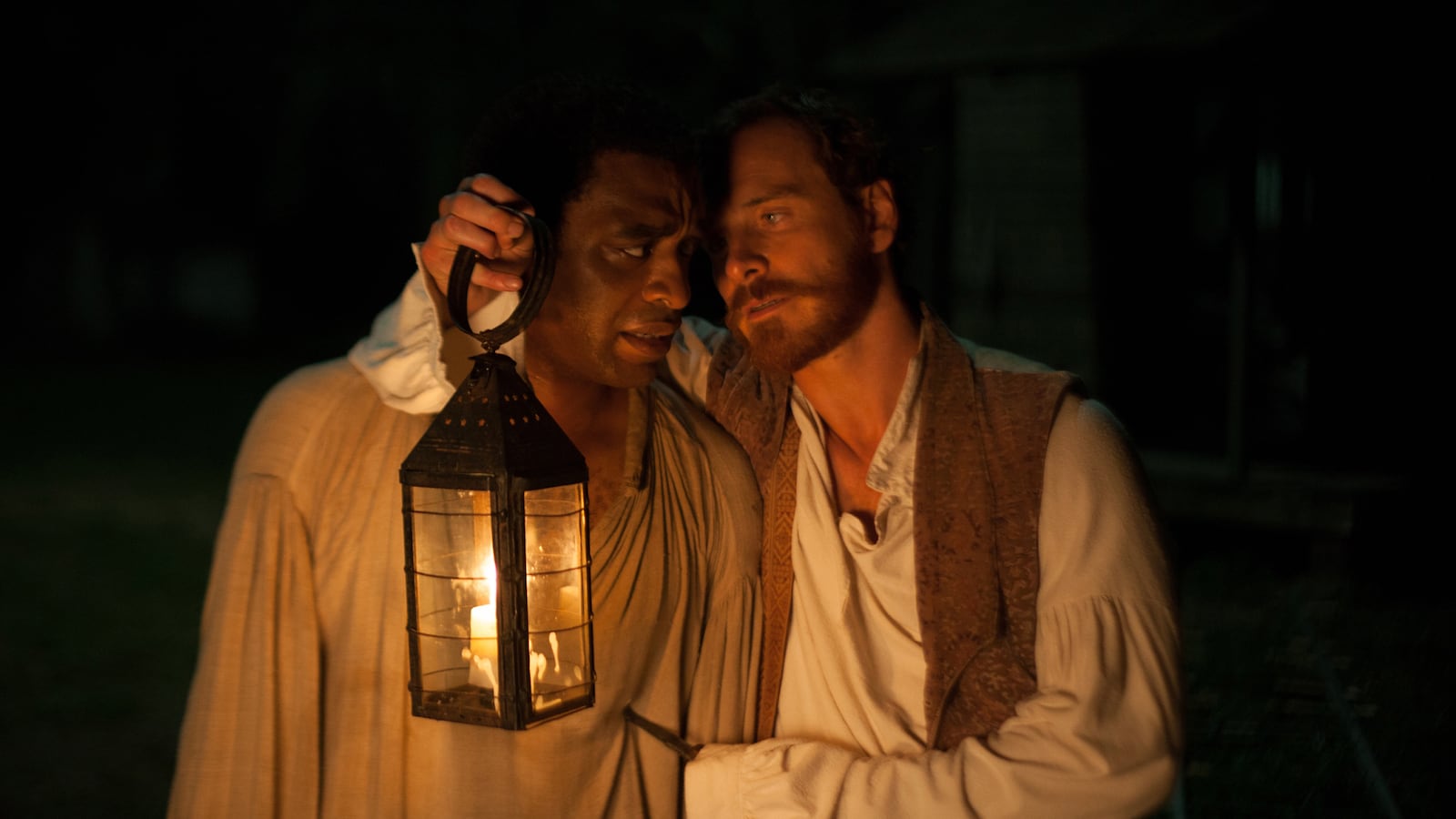Memo to Steven Spielberg: this is how you capture slavery onscreen.

Following its debut screening at the 40th annual Telluride Film Festival, the drama 12 Years a Slave, helmed by acclaimed visual artist-turned-filmmaker Steve McQueen (Hunger, Shame), left the audience in stunned silence. Even the stars of the film were shell-shocked.
“I think it might be more productive if we all just had a group walk around the block or something,” said Brad Pitt, who produced and has a bit part in the film, during a post-screening Q&A.
“It's the first time I’ve seen the film, and honestly, I’m a little taken aback,” added co-star Michael Fassbender.
McQueen’s movie is, far and away, the most uncompromising depiction of slavery ever put to film. Cracking whips rip flesh off backs with rapacious license. Women are raped and mutilated. Men, women, and children are stripped naked and inspected like chattel, and later, lynched with impunity. But this is as it were, and the violence in the film is never fetishized, but rather serves as a stark reminder of what so many black men, women, and children endured in this country’s not-so-distant past.
12 Years a Slave is based on the 1853 biography of Solomon Northup (Chiwetel Ejiofor), a free man and ace fiddler living with his wife and two children in Saratoga, N.Y. One day, two affable gentlemen convince him to accept a fiddling gig with a traveling circus in Washington D.C., for which he’ll be compensated handsomely. One night, the duo gets Solomon drunk, and when he awakes, he’s bound in chains.
“You’re just a runaway n***r from Georgia… Are you a slave?” screams his captor. When Solomon pleads his innocence, he’s paddled and whipped until his shirt is in bloody tatters.
Before long, Solomon finds himself on a ship headed for New Orleans. A fellow slave onboard (Chris Chalk) warns him to play dumb if he wants to survive.
“Don’t tell no one who you really are, and don’t tell no one you can read and write, unless you want to be a dead n***r,” he says.
When the ship docks, the “property” is scooped up by a sleazy slave merchant (Paul Giamatti), and sold at auction. Solomon is purchased for $1,000 by William Ford (Benedict Cumberbatch), a Baptist preacher and plantation owner who takes a liking to him, and treats him with respect (given the circumstances). Before long, however, Solomon runs afoul of his redneck sub-master (Paul Dano) and, after whipping him in a fit of rage, knows his days at Ford’s plantation are numbered. He’s sold to Edwin Epps (Michael Fassbender), an evil alcoholic slave master who’s convinced he’s doing god’s will by beating and maiming his “property.”
As Edwin, Fassbender is utterly terrifying in his unpredictability. You never know if he’ll stab you in the chest, or unleash his teethy smile. Unlike Leonardo DiCaprio’s P.T. Barnum-esque mandingo monster in Django Unchained, Edwin is not a caricature, which makes him all the more menacing. His sadistic obsession with his prized cotton-picker, a teen slave who goes by “Patsey,” played by newcomer Lupita Nyong’o (a revelation), is especially disturbing. The more he yearns for her, the worse he treats her, refusing to even let her wash herself. We haven’t seen a character this revoltingly racist since Ralph Fiennes’ Amon Goeth in Schindler’s List. And, Edwin’s wife Mary (Sarah Paulson), isn’t much better. She’s manipulative monster in the Lady Macbeth mold who forces Edwin to take out her own jealousies and insecurities onto the slaves—especially poor Patsey.
There are shades of The Pianist here, as McQueen tells the real-life story of a talented musician who is suddenly thrust into chaos, and must endure unspeakable hardships. And, like Adrien Brody before him, Chiwetel Ejiofor delivers an astonishing performance full of gravitas. The occasional outburst aside, the beauty in Ejiofor’s turn is in the quieter moments, where McQueen lets the camera linger on Solomon’s face so that we all bear witness to the full breadth of his torture, and how his soul has been all but vanquished.
And, while there are many startlingly violent scenes, they are juxtaposed with beauteous ones. McQueen and his cinematographer Sean Bobbitt capture the beauty amid the ugliness—lush Cypress trees towering over sullied waters, boilworms slithering over cotton plants, and the embers of a fire being devoured by the darkness. It’s all hauntingly poetic.
The only minor—and they are minor—downsides come courtesy of Hans Zimmer’s booming score, which sounds like a mash-up of that blaring noise from Inception and Shame’s strident synths, as well as a cameo by Brad Pitt as a Canadian carpenter who believes that, “in the eyes of god, what is the difference” between blacks and whites.
But this is a triumph of a film, and one that you’ll be hearing plenty more of during awards season.






